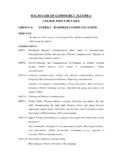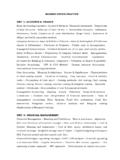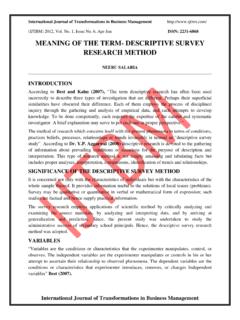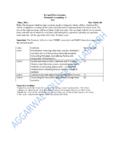Transcription of UNIT 1 LANGUAGE: CONCEPT, ITS NATURE AND …
1 1 unit 1 LANGUAGE: concept , ITS NATURE AND characteristics structure Introduction Objectives Role of English Language meaning of the Term Definition Place of English .Language in India Development of English Language Importance of Teaching English Impact of other Languages on English English as an International Language Status and NATURE of English Language Teaching in India Status of English within the Formal Instruction System NATURE of Language characteristics and Significance of Language in Human Life characteristics Significance of Language in Human Life Misconceptions about Language Modern English usage Future of English as a Window on the World Check your progress Let us sum up Answer/clues to answers of check your progress References/Further readings.
2 2 INTRODUCTION The world is shrinking rapidly today. Advances in information technology, scientific knowledge and applications have transformed a sprawling earth into a global village. People of various cultures and nationalities now meet, interact, trade, socialize with ease on a daily basis. English becomes official language of the administration, medium of instruction, and subject of study in the Indian Schools and University. A knowledge of English is considered as necessary for activity, thought and employment. Making this possible is the use of a common language-English. English is used by over 500 million people across the globe. One person out of every four persons in the world can be reached through English.
3 50% of the world's newspapers, scientific and technical journals and over 60% of the world's radio stations use English as a means of communication. It is also the official language of the UNO. Speaking English became a fashion. It is an important foreign language that has attained the status of link language in different countries of the world. It holds important place in education system. Even, we can say, that it holds unique position in India. Besides, being a link, it is our major window to the modern world. OBJECTIVES To understand the different role of language To familiarize with the NATURE of language To enable the students to understand the place of English. To enable the students to understand the need and importance of the language.
4 To enable the students to understand the significance of the language in human life. To enable the students to know the basic characteristics and functions of the language. To enable the student-teachers develop linguistic skills among their pupils. To asses the status of English language. To view the central role of language in human society. 3 ROLE OF ENGLISH LANGUAGE English has been playing an important role in our educational system as well as in our national life. It was supreme in the pre-independent India. Though, In free India, English could not be allowed to occupy the position of privilege. This was acknowledged by all the persons consequently. It was decided that regional languages should be developed and that Hindi should replace English.
5 Nothing can be said against these things. Independent India must have its own national language. meaning of the Term Derived from Latin Lingua which means tongue and the French term langue, language is the "entire complex of phenomena associated with human vocal and auditory communication of emotions and ideas." Language is called a social phenomenon, because it has relevance only in a social setting. Language undergoes a continuous, though unnoticed, process of growth and change. It becomes sharp, crisp, refined and versatile with the passage of time. Pick up the historical background of any language; you will be astonished to notice the major changes in spellings, meaning , pronunciation and its connotation and denotation.
6 Hence, language is a living phenomenon. In its broadest and most general sense, "language may be said to be any means of expression or mental concepts by any living beings whatsoever and of communicating them to, or receiving them from, other living beings." Language is a very complex human phenomenon; all attempts in define it have proved inadequate. In common parlence it may be said that language is an organised noise used in actual social situations. Thai is why it is defined as contextualised systematic sounds. Patanjali defined it as that human expression which is uttered out by speech Organs. Encyclopaedia Britannica defines language as "a system of conventional, spoken or written symbols by means of which human beings, as members of a social group and participants in its culture, communicate".
7 4 Definition 1. "Language is a primarily human and non- instinctive method of communicating ideas, emotions and desires by means of a system of voluntarily produced symbols" (Sapir). 2. "Language, in its widest sense, means the sum total of such signs of our thoughts and feelings as are capable of external perception and as could be produced and repeated at will" (A. H. Gardiner). 3. "Language may be defined as the expression of thought by means of speech-sounds" (Henry Sweet). 4. "A system of communication by sound , through the organs of speech and hearing, among human beings of a certain group or community, using vocal symbols possessing arbitrary conventioal meanings." (Mario A Pei & Frank Gaynor). 5. Language is verbal systematic a means of transmitting form of social (with a) high degree of convention" (J.)
8 Whatmough). 6. "A language (is a) symbol based on pure or arbitrary infinitely extendable and modifiable according to the l bunging needs and conditions of the speakers" (R. H. Robins). 7. "A language is a device that establishes sound- meaning correlations, pairing meanings with signals to enable people to exchange ideas through observable sequences of sound" (Ronals W. Langacker). 8. "A language is "audible, articulate human speech as produced by the action of the tongue and adjacent vocal The body of words and methods of combining words used and understood by a considerable community, especially when fixed and elaborated by long usage; a tongue" (Webster). Place of English Language in India Pandit Nehru was certainly correct when he said, "English is our major window on the modern world".
9 Its importance as an international language can be denied by none. It is only through English that we can establish social, economic, cultural and political relations 5 with other countries of the world. It opens a wide window of international relations for us. If we close this window, we will shut ourselves up in the four walls of our nationality. This will certainly bring about our decay and downfall, because modern science has reduced the vast dimensions of the globe to the size of a small ball. Under, such circumstances we cannot ignore English we should give Hindi the place of national language. But this never means that English should be completely eradicated from the Indian curriculum. "English is a language which is rich in literature, humanistic, scientific and technical.
10 If under sentimental urges we should give up English, we would cut ourself off from the living stream of evergrowing knowledge." -University Grant Commission "No language ancient and modern can be compared with English in the number of its speakers, writers and readers all over the world." French "English literature in quantity and quality is second to none in the world." -Champion Development of English This can be traced back to the period 1150 to 1400, ending with authors such as Chaucer and Gowen. Thus, upto the 15th century it was a period of middle English with Chaucer "the uneclipsed sun of modern English began to rise and shine." The origin of the language can be related to Germanic Languages, although it plainly differs from them.









